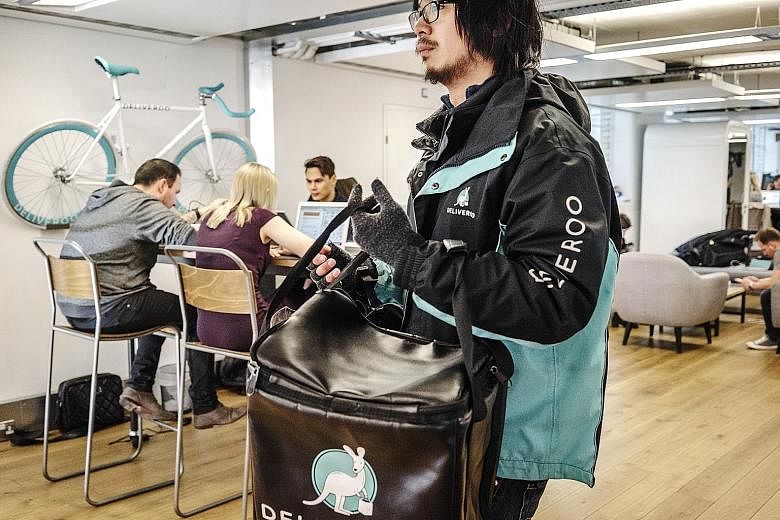Amazon.com and British food delivery start-up Deliveroo are in some ways cosier bedfellows than Uber Technologies is with its own competing service, Uber Eats.
The United States e-commerce giant led a US$575 million (S$791 million) financing round in London-based Deliveroo last Friday.
One cannot help but wonder whether the investment is an amuse-bouche for a broader tie-up, a chance for Amazon to get a detailed look under the hood of Deliveroo's operations before evaluating an acquisition.
There are a lot of reasons why that would make sense. The obvious one: Amazon wants a food delivery service. It shuttered the London operations of Amazon Restaurants last year amid a fierce price war with Deliveroo, Uber Eats and Just Eat. But there's merit in maintaining a presence in app-based food delivery services.
Platforms in Latin America and India are already extending into products such as pharmaceuticals and groceries, and that approach could spread to other regions.
That poses a threat to Amazon, not least because users tend to access food delivery apps more regularly, according to Mr Chris Caulkin, a venture capital investor with General Atlantic in London.
The Deliveroo network of couriers must also appeal to Amazon. If you can ensure that the people making your deliveries have little or no downtime, they can make more money and are therefore less likely to go and work for a rival, since they are paid for each delivery they complete.
If they are able to transport both goods from Amazon Prime Now, which promises deliveries within two hours, and Deliveroo meals, then the likelihood of downtime is reduced.
Deliveroo's push into so-called "dark kitchens" might also help with Amazon's logistics. These are facilities that are not attached to a physical restaurant, often housed in shipping containers on sites dotted around London.
While the model remains unproven, the idea is to reach more customers without the pricey overheads that come with an actual restaurant.
Those locations could also act as last-mile fulfilment centres for Amazon, and Deliveroo plans to use many of the proceeds from the latest fund raising to open new sites.
The brand cachet of Deliveroo, which tries to focus on convenience rather than fast food, aligns well with Amazon's goals: It appeals to a similar customer base as Whole Foods, the high-end health food store that Amazon acquired in 2017.
The fresh influx of cash means that European food delivery price wars are likely to continue unabated, which is reflected in the share-price drop of rival services.
The key difference between Amazon-Deliveroo and Uber-Uber Eats is that, on the whole, the people who deliver food for Uber Eats are not the same as the ones who ferry customers around for Uber.
Though there is of course technological crossover in the systems that manage the two products, the operational crossover is more limited. That exposes Uber to high driver and deliverer churn, where they are more likely to jump to a rival that can guarantee more income.
Nonetheless, it's sensible for Amazon to start with a venture capital investment in Deliveroo rather than an outright takeover, as it was reported that the two firms investigated last year.
Already, the tie-up has sent a shudder among Europe's listed online food delivery companies.
Just Eat shares slumped nearly 11 per cent last Friday, the biggest casualty of the news. Takeaway.com and Delivery Hero also slid on concerns that the move may lead to new competitive pressures.
"From the point of view of a business owner, we can't think of much more terrifying news than hearing Amazon is entering your backyard," said Mr Ameet Patel at Northern Trust Capital Markets.
There's plenty of scepticism, not least from me, about how profitable food delivery can really be, and whether it can sustain its growth.
Deliveroo made a loss of £184 million (S$323 million) on revenue of £277 million in 2017, the most recent year for which data is available. The business remains unproven, and concern about the path to profitability was a factor in Uber's disappointing initial public offering this month.
An Amazon-Deliveroo tie-up could ease concerns about profitability. But it's also wise for the Seattle-based firm to test how viable it would be to team up before committing to an acquisition.
BLOOMBERG
- Alex Webb is a Bloomberg Opinion columnist covering Europe's technology, media and communications industries. He previously covered Apple and other technology companies for Bloomberg News in San Francisco.

